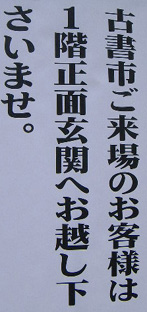O-kyaku-samaO-kyaku-sama is a polite form of the word kyaku 'guest, customer'. It is used in contexts, especially commercial contexts, where ritualised formal politeness is expected. Although guests may be referred to as kyaku when they are not within hearing, careful speakers, in particular female speakers, will ensure that guests or customers are referred to deferentially as o-kyaku-sama in all circumstances. There are several choices in writing o-kyaku-sama in Japanese. The most common usage seems to be お客さま with both the honorific prefex o- the honorific suffix -sama in hiragana:
This formula is the type preferred by corporate PR policies. Putting the o- and the -sama in hiragana conveys a clean, uncluttered image and removes the feeling of stiffness or pendantry that clings to overuse of Chinese characters. However, variation can be found, as in the following signs:
The top sign is also from Mizuho Bank, but is an ad hoc sign made by staff. Here the -sama is put in Chinese characters (お客様), conveying a slightly stiffer feeling. The second sign, although professionally done, is also not a part of a corporate image PR kit and writes -sama as 様. It is a general feature of hand-made signs that they have relatively high concentrations of Chinese characters, possibly because people feel it is more 'literate' to use as many kanji as possible. I found no cases of 御客様 o-kyaku-sama, which is in line with the general trend to write the honorific prefix o- in hiragana, not kanji. However, examples were found with a Google search in August 2003:
There were also some instances using katakana. |
| Previous Next |


